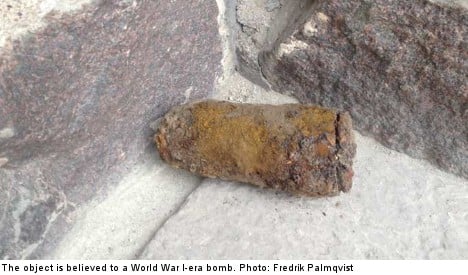“I put a small shovel into a pile of dirt and heard a distinct ‘clang’,” a still somewhat shaken Fredrik Palmqvist told The Local.
Palmqvist chairs a local Kalmar cultural association, Turbine, which uses the cavernous, dungeon-like space in the bowels of the historic landmark as a meeting space.
On Monday, a few members of the group had gathered to finally clear away a sizeable pile of dirt and debris near the room’s front entrance. As Palmqvist bent down to clear away the pile, his dustpan hit something metalic
“I got down on my hands and knees and began scooping away the dirt. At first I thought it was a food canister from the military,” he explained.
But as Palmqvist further examined the rusty object, which measured about 25 centimetres in length with a diameter of 10-12 centimetres, he was soon overcome with fear, realizing the cylinder-like object was likely a bombshell.
“It came as quite a shock. I picked it up in my hands and ran out of the room,” he said.
Palmqvist placed the shell in a small alcove in the wall itself.
“I figured that was the safest thing to do. I then told the others to go home and I called the police,” he explained.
He also snapped a picture of the object and sent it to the police, who in turn alerted the bomb squad in Malmö.
Police arrived on the scene and evacuated the area as a precaution while they investigated the find.
“The experts in the bomb squad were 100 percent certain it was some sort of military ordinance. But because it was so rusty, they weren’t sure how old it was,” Palmqvist explained.
“But one said it might be from the 1800s.”
According to Palmqvist, the room his group now uses for meetings was once used by the Swedish military to store ammunition.
“We’ve seen old pictures indicating it was used to house ammunition during wartime. We’ve previously found rifle shell casings on the floor,” he said.
The bomb squad eventually secured the bombshell, giving the area the all clear around 1am on Tuesday morning.
However, it remains unclear whether or not the shell still possessed the explosive power it once had.
“They don’t know if it was live, but that older ordinance is especially dangerous because it is so unpredictable,” said Palmqvist.
“It’s frightening to think what could have happened. Nevertheless, it’s an amazing historical find and our group very much hopes to get the shell back.”
David Landes



 Please whitelist us to continue reading.
Please whitelist us to continue reading.
Member comments